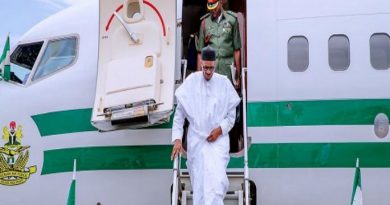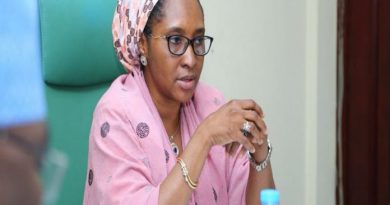Periodic Status Analysis of Nigeria – Bangladesh Bilateral Relations with recommendations for the future. Full Text
During Nigeria’s hosting of the 2010 D8 meeting in Nigeria, Prime Minister of Bangladesh Sheikh Hasina paid an official visit to Abuja followed by the opening of the Bangladesh High Commission in Abuja Nigeria in 2016. Trade and investment, agriculture and tourism are chief areas for cooperation between the two countries.
Ultimately, I think having clarity of
purpose and going about the relations
with eyes wide open about the need for
expanding trade and investments
anchored on a confident and willing
private sector allows both sides to align
incentives and to create the binational
interest for the desired goal. Nigeria
Bangladesh relations which refer to the
bilateral engagements between the
two countries. Both Nigeria and
Bangladesh are members of
international organizations like
Organization of Islamic Cooperation,
Developing 8 (D8) Countries etc.
Events in the evolving relations
between the two friendly nations over
the last five years qualifies for a cursory
review by parties and stakeholders in
the Nigeria Bangladesh relations as
undertaken by the African Center for
Asia Plus Bangladesh Studies (AfCA+BS), 2022 which generally summarized that “continous high level engagement by the governments and researchers; mutual respect and reciprocity, articulating goals and weaknesses, and practical business to business networking are among the ways Nigeria and Bangladesh could facilitate better and expanded bilateraltrade and investments”.
Relationship Between
Bangladesh and Nigeria.
Economically Bangladesh and Nigeria have expressed mutual interest to expand the bilateral trade and investment. Bangladeshi
pharmaceuticals, knitwear, cement, jute
and jute goods, ceramics, ocean-going
vessels, light engineering, leather and
plastic goods have been identified as
products with huge potential in the
Nigerian market. Nigeria has urged
Bangladeshi businessmen to invest in the agriculture, pharmaceuticals, medical equipment’s, ICT, food-processing, and education sectors of Nigeria. Trade between the two countries stood at US$14 million in 2012.
In 2014, Bangladesh Tariff Commission prepared a feasibility study for the benefits of signing new Free/Preferential trade agreements with African states and recommended that Nigeria along with Mali are the most promising countries for signing such agreements. The result indicate progressive growth in such areas
as pharmaceuticals/health, finished
clothig, textiles and garments (CTG,),
ceramics, iron momgering, electricals,
education, in favour of Bangladesh.
Nigeria needs to take advantage of the
concentric diversification initiative of the current NDP (2021-2025), to scale up
export to Bangladesh in sectors of
comparative advantage like ginger,
cocoon, Nigerian rice, leather, cynamom, oil and gas, ICT, Digital economy and other emerging sectors. Potentials, Prospects and Current Status
Pursuing economic contents of
diplomacy has been one of the focused
areas of the High Commission as there
are huge potentials of enhancing
commercial links between the two
countries.
While the Nigeria Bangladesh
Business and Technology Forum
(NBBTF) accredited as a trade group
supports the Bangladesh High
Commission’s pursuit of econmomic
content and diplomacy, NBBTF has
undertaken a few courtesy
engagement with the High
Commissioner, HE. Masudur Rahman
ndc, who participates and presents the
sectoral and broad benefits of a robust
Nigeria Bangladesh bilateral relations
and indeed showcases Bangladesh’s
export potentials.
Coming after a visit by the High
Commissioner with the NBBTF to the
Minister of State for Budget and
National Planning in May 2022, a visit
and presentation of the NBBTF and the
enterprising High Commissioner to the
National Inland Waterways Authority of
Nigeria consolidated the acceptance of
the Mangaing Director of the Authority
to lead his management team on an
experience sharing visit in October,
2022 to the Bangladesh Inland
Waterways Authority, Light
Engineering and Ship building facility
and special attendance at the 4th
Marine Expo at the Convention City,
Darka, Bangladesh thus precipitating
the first high level Nigerian Trade
Mission and engagement with
Bangladesh –a decade after the Prime
Minister’s visit in 2010. Bangladesh for
the records is also known as the Delta
nation boasting of about 900 rivers, 50
of which are of international origin.
NBBTF makes every effort to
strengthen and develop mutually
beneficial cooperation between Nigeria
and Bangladesh and use different
instruments for this aim. We are
established to help business-circles to
open new markets and explore existing
opportunities. Our mission is to make
business transactions convenient for
our members and clients in Nigeria and Bangladesh.
Currently, we develop
export consulting service that support
functioning and potential exporters
within the bilateral market entrance.
The export consulting process means
undertaking some stages that include
wide range of the research, analytical
and transactional activities. We are
ready to receive your request on
bilateral cooperation in the two
countries.
A lot of our services are free of charge
with only little membership
administrative charges involved. Do not
lose such opportunity. To assure you of
our reliability, we can provide you
statutory documents and other official
documents of our bilateral trade group,
as well as send feedback about our
work experience.
We have different platforms for our
activities including the Nigeria
Rapidtrade Bangladesh
and the AfCA+BS to facilitate the attainment of your trade and investment dreams in the two countries.
In order to find a qualified potential
partner, NBBTF recommends using our
services, to conduct initial screening
and meet with potential partners,
agents or representatives. It is possible
to initially check your new and old
business partners with whom you plan
to enter into agreements or have
already established relationships. For
convenient and reliable trade
facilitation, NBBTF will launch a number of electronic services. NBBTF can find a reliable partner for you in both countries!
Nigeria is an important country in Africa which plays a vital role in the African Union and ECOWAS and possesses huge economic and business
potentials; the largest economy of
Africa and 6th largest producer of oil in
the world. It is a huge market of over
200 million people and still an importdependent country for most of her requirements. While it is necessary to stave off opportunities for self
preservation, it is important to nurture
the budding bilateral trade efforts by
ensuring mutual respect for our citizens
through appropriate diplomatic
channels in order to build mutual
confidence in the peoples and
governments. The two countries have
work to do in order to exploit the
potentials of our relations and prospects
of our markets.
According to information
of the the High Commission information
in 2020 , there was increased demand of
business visas (around 300 visas in each
month and most of them are for business purposes until the outbreak of Covid-19 which indicated the growing interest about Bangladeshi products among the Nigerian business community which led to the demand and requests for
establishment of specialized trade
groups aside existing Nigeria Bangladeshi
Chamber of Commerce. It has thus
become highly desirable too, for the High Commission to encourage and facilitate exchange of high-level visits including trade delegation as an important strategy to inject dynamism in bilateral relations.
In more recent years, Bangladesh has
emerged as a relatively high-growth
developing country with a significant
manufacturing base rooted in the
garments and textile industries aside the other equally booming sectors as would be seen in content of this essay. Investing in Nigeria or forging strong commercial links can bring huge profits for Bangladeshi investors/exporters and vice versa. though security remains a major challenge, the seeming mistrust between the two countries also becoming a major concern likely to affect the expanding but yet feeble trade relations.
Bangladesh must know as a fact that many foreign countries including a good number of Asian and especially the ASEAN countries have developed mutually beneficial & strong (commercial) relationship with
Nigeria and they see Nigeria and
Nigerians as extremely warm, friendly
and well-mannered.
Bangladesh is considered one of the
global emerging economies among the
developing countries. Over the last few
years, Bangladesh economy experienced sustained growth in GDP. At the same time Bangladesh stands among the severely affected countries due to climate change. Hence Bangladesh needs to search for alternative means of sustenance especially in terms of food
production and at the same time to
avoid pressure from her huge
population. Thus, further exploration of
foreign markets has become a
necessity for an emerging economy like
Bangladesh.
Nigerians are keen to see that Nigeria
Bangladesh relates to draw on areas of
comparative advantage for their
mutual benefits, including
collaborations for textile/RMG,
pharmaceuticals, jute and ceramics
factories in Nigeria leveraging the wide
expertise Bangladesh has in these
sectors. Bangladesh already exports
large pharmaceutical, garments and
clothing and other products to Nigeria.
Bangladesh can also benefit by joint
ventures particularly in the fields of
textiles/RMG as Nigeria has access to
AGOA including duty and quota free
access to US market while Bangladesh
can’t avail this facility as a LDC. It is
important to note that Nigeria is trying
to reduce its dependence on oil and
diversify its sources of revenues which
paves the way for foreign investments.
Challenges and Opportunities
Investing in Nigeria or forging strong
commercial links between the two
nations can bring huge profits for both
investors/exporters and Bangladesh
should overcome the mind-sets about
Africa which largely remains
unexplored. There has been a negative
perception about Nigeria nay, Africa
almost all over the world. Bangladeshis
are no exception to that as they have
also recently created some disturbing
confidence crises in the evolving
Nigeria Bangladesh bilateral relations
with a balance of trade currently in
favour of Bangladesh.
With the Covid -19 pandemic and the
accompanying restrictions, physical
travel became highly restricted with
Nigerian traders compelled to engage
in e-trading to procure goods and other
merchandise from Bangladeshi traders
with the attendant challenges. Many
times, the Nigerian traders and buyers
complain about huge scams relating to
refusal of the Bangladeshi merchants
and traders to meet transaction
obligations in terms of specification for ordered goods, leading to several
losses by the Nigerian traders.
While Nigerians have also recently
breached diplomatic privileges with
high numbers in Bangladeshi
prisons/detention facilities, some of
the Bangladeshi infractions and
incidences against Nigerians reportedly
brought to the attention of the High
Commission in Abuja has not received
desired responses to the complainants
and therefore, huge losses to the
Nigerians. This has invariably triggered
a smear in relations leading to a blanket
high restraint by the Bangladeshis in
visa issuance to Nigeria and African
travellers with only Morroco appearing
as favored country receiving good
attention for their visa processes as at
date.
AfCA+BS advocate for mutual and
reciprocal confidence promoting
actions by both friendly nations to
incentivise our expanding bilateral
engagements through promotion of
high level engagements with pulic and
private sector entities. This way, we
must shun that age old medieval days
ideas about total behavior of the
Africans and update ourselves about
present day rising Africa. These and
many creeping issues have recently
impacted the once expanding bilateral
relations fostered by the High
Commissioner, Mr. Masudur Rahman
ndc and his predecessors.
Expanding bilateral interaction across
the sectors between Nigeria and
Bangladesh will be a mutually beneficial
act and for Bangladesh –a not so
outgoing nation, except recently, It is
interesting to note that Africa is the
second largest continent with a total
land area of more than 3,025.8 million
hectares, abundance of natural
resources, 54 sovereign countries and
180 million hectares of arable land.
With Nigeria alone having over 925
nautical miles of shoreline, over 10,000
inland waterways and about 3000 un
navigable waterways, substantially un
explore maritime sector worth over $1
trillion amongst the other sectors of
pharmaceutical/health, education,
culture, Garments, Textiles and
Clothing, cocoon, Jute and Jute
products, equipment leasing and
technology, light engineering,
construction, ceramics, agriculture and
agro-allieds, and so on, presents an ideal
investment environment in Africa.
Bangladesh must explore Africa’s “mutually beneficial trade and
development opportunities in order to
disrupt current exploitative trade blocs
cognisant that, for many decades, most
of the African States were involved in
non beneficial trade terms with the so call developed economies. As members of several global and development blocs, Nigeria and Bangladesh could spell a new horizon in international relations from mutually beneficial and respected positions.
The vast majority of Africans had been
struggling hard to get away from their
distressed life. However, African
countries experienced rapid economic
growth in the last decade. Africa could be the world’s breadbasket and have
inherent resources to feed the rest of the world if well managed. Regrettably, and according to the African Development Report (2012), Africans’ food security is much below that of the accepted standard. Many investors have already identified Africa as a potential business hub. Vast resources and huge potentials of Africa have already started attracting foreign investors.
CONCLUSION
Bangladesh and Nigeria investors could
immediately come forward to explore
these abundant resources through better investment planning in Africa. African States import from Asia have expanded in the past 20 years. As African States begin to explore areas of cheaper products due to worsening value of local currency in international market.
The Chinese government have concentrated resources in development of the African for their interest. Bangladesh to background that strategy in order to penetrate and potentiall, dislodge current exploitative market holders in the Nigerian scenario. It is also imperative that the High Commission scale up economic, cultural and political diplomatic machineries to expose the comparative advantages of
progressively expanding Nigeria
Bangladesh relations, such that will
encourage active reciprocal visits
across the government and private
sectors.
The Bangladesh government can also
improve their cooperation with African
States in import- export to be part of
the growing African market as the
Nigeria National Development Plan
(NDP 2021-2025) implements the
Nigeria Concentric Econpomic
Diversificatson initiative and AfTta
open up the Nigerian and African
market.
AfCA+BS advocates the
immediate activation of the Nigeria
Bangladesh Binational Commission to
give fillip to a more cordial, respectful
and impactful trade and investment
facilitation between the two countries.
This will also provide the necessary
diplomatic comfort for friendly bilateral
conducts and attainments in identified
areas of comparative advantage, as
well as providing the platform for
checking potential conflict areas early,
before their escalation.
AfCA +BS is a body committed to
providing scholarly research and
understanding on Asia with focus on
Bangladesh and between institutions of
higher learning in Asia and Africa. The
scope of the Center’s engagement
includes but not limited to reciprocal
research information on leadership,
governance, diversity management,
technology and various developmental
programs allied to Bangladesh and
Nigeria and establishing connection for
greater excellent, genuine and authentic
perspectives through promoting
understanding with researchers in both countries. As the foremost African Think Tank with focus on Bangladesh therefore advocates, orchestrates and enable mobilization of resources for scholars and students who focus on our thematic areas and ideals. The Center has a reciprocal mandate and will commence full operation in Q4, 2022.
AfCA+BS
AFRICAN CENTRE FOR
ASIA +BANGLADESH STUDIES
At Abuja
August, 2022.




